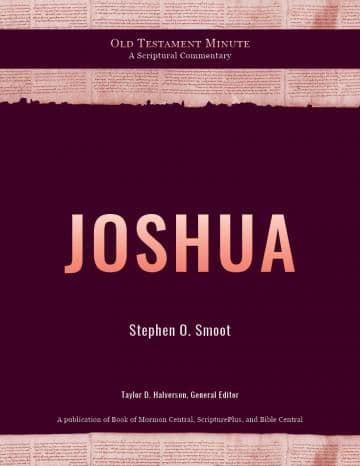Book
24 Chapters

The tenth chapter of Joshua narrates the defeat of a coalition of Canaanite petty kings under the command of Adonizedek of Jerusalem. It is divided into two narrative sections. The first runs from verse 1 to verse 15, describing the initial battle, and the second from verse 16 to verse 43, describing the capture and execution of the kings themselves. Each section ends with the same statement, reinforcing the sections’ thematic continuity (see verses 15, 43).
The first narrative section describes a great battle at Gibeon between the Israelites and the Canaanite coalition. It preserves one of the more remarkable miracles of the Bible: that of the sun standing still to give the Israelites enough daylight to finish their triumph over their foes (verses 11–14). Although obscured by the typography of the King James Version Bible, Joshua’s speech at verse 12 is poetry with a parallelistic declaration:
Sun, stand thou still upon Gibeon;
and thou, Moon, in the valley of Ajalon.
The precise phenomenon described in this scene is difficult to fully ascertain, but elsewhere in scripture (most notably in the Book of Mormon with the sign of Christ’s birth as described in 3 Nephi 1) God manifests His power in cosmological displays.[1]
The reference to the book of Jasher at verse 13 is one rare instance when a biblical narrator identifies his source. This book, probably a collection of war poems or epic tales, is now lost but presumably is the same book referenced elsewhere in the Bible as a source for the compilers of Israel’s history (see, for example, 2 Samuel 1:18).
The second narrative section of Joshua 10 describes how after the battle of Gibeon, Joshua pursued the leaders of the anti-Israelite coalition and executed them. These five Canaanite kings attempted to conceal themselves in a cave near the site of Makkedah (verses 16–17). After defeating the remainder of the Canaanite forces (verses 18–21), Joshua turned his attention back to the remaining kings. The practice of placing feet on the neck (see verse 24) is a common ancient Near Eastern image of submission or subjugation. Joshua included his captains in this quasi-ritualized taunt of Israel’s enemies probably to raise morale in the army (verses 24–25).
These five kings shared the same fate as the king of Ai—namely, being hanged on a tree (verses 26–27; compare 8:29). In line with the Deuteronomic injunction, Joshua removed the bodies of the executed kings from the tree by sundown. In a final act of irony or poetic justice, the cave where the five kings concealed themselves earlier in the narrative became their tomb (verse 27).
The concluding portion of Joshua 10 recounts the capture of various southern Canaanite towns (verses 28–43). It wraps up the southern campaign with fairly repetitive (almost formulaic) language. The language is also totalizing, depicting Joshua and the Israelites as having totally dominated their Canaanite foes. This will factor into how the book of Joshua relates to the book of Judges both historically and narratively, as the latter book depicts Canaanite remnants as a continued presence or threat in the land.
[1] See Book of Mormon Central, “How Was There a Night Without Darkness? (3 Nephi 1:15),” KnoWhy #188 (September 15, 2016), online at https://knowhy.bookofmormoncentral.org/content/how-was-there-a-night-without-darkness.
Book
24 Chapters
Items in the BMC Archive are made publicly available for non-commercial, private use. Inclusion within the BMC Archive does not imply endorsement. Items do not represent the official views of The Church of Jesus Christ of Latter-day Saints or of Book of Mormon Central.